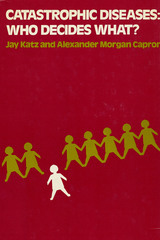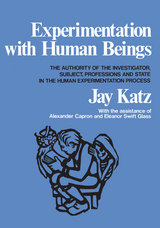2 books by Capron, Alexander Morgan

Catastrophic Diseases
Who Decides What?
Jay Katz
Russell Sage Foundation, 1975
People do not choose to suffer from catastrophic illnesses, but considerable human choice is involved in the ways in which the participants in the process treat and conduct research on these diseases. Catastrophic Diseases draws a powerful and humane portrait of the patients who suffer from these illnesses as well as of the physician-investigators who treat them, and describes the major pressures, conflicts, and decisions which confront all of them. By integrating a discussion of "facts" and "values," the authors highlight the forces which affect new developments in medicine—such as kidney and heart transplants—and the controversial issues they generate. Katz and Capron explore these issues through the use of dual conceptual perspectives. Their study first examines and evaluates the authority which should be vested in each of the chief participants in the catastrophic disease process—the physician-investigator, the patient-subject and his relatives, the professionals, and the state. Challenging questions are raised concerning medical education, informed consent, and professional responsibility. The authors next explore how the roles and capacities of the participants vary not only according to the basic issues they face but also according to the point in decision-making at which these issues arise. The process of investigating and treating catastrophic diseases, the authors believe, can thus usefully be divided into three decision-making stages—the formulation of policy, the administration of research and therapy, and the review of the decisions and their consequences. In conclusion, Katz and Capron demonstrate the need for a variety of individuals and groups with diverse values to be involved in decision-making in a manner which will not unnecessarily impede the scientific investigation of these diseases.
[more]

Experimentation with Human Beings
The Authority of the Investigator, Subject, Professions, and State in the Human Experimentation Process
Jay Katz
Russell Sage Foundation, 1972
In recent years, increasing concern has been voiced about the nature and extent of human experimentation and its impact on the investigator, subject, science, and society. This casebook represents the first attempt to provide comprehensive materials for studying the human experimentation process. Through case studies from medicine, biology, psychology, sociology, and law—as well as evaluative materials from many other disciplines—Dr. Katz examines the problems raised by human experimentation from the vantage points of each of its major participants—investigator, subject, professions, and state. He analyzes what kinds of authority should be delegated to these participants in the formulation, administration, and review of the human experimentation process. Alternative proposals, from allowing investigators a completely free hand to imposing centralized governmental control, are examined from both theoretical and practical perspectives. The conceptual framework of Experimentation with Human Beings is designed to facilitate not only the analysis of such concepts as "harm," "benefit," and "informed consent," but also the exploration of the problems raised by man's quest for knowledge and mastery, his willingness to risk human life, and his readiness to delegate authority to professionals and rely on their judgment.
[more]
READERS
Browse our collection.
PUBLISHERS
See BiblioVault's publisher services.
STUDENT SERVICES
Files for college accessibility offices.
UChicago Accessibility Resources
home | accessibility | search | about | contact us
BiblioVault ® 2001 - 2024
The University of Chicago Press









